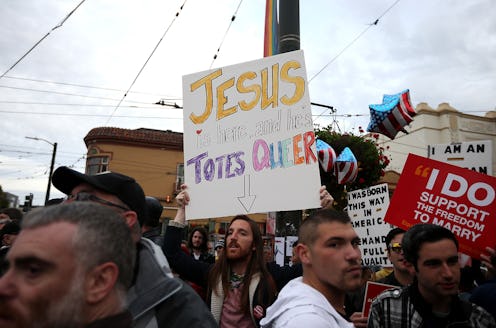News
A Minister May Be Our New Favorite LGBT Activist
For most people, officiating their adult child's wedding may be an unusual act, but it's probably not the start of an activist career. Yet that's exactly what happened to Frank Schaefer, a minister in the United Methodist Church who officiated his son Tim's marriage to his male partner. Following the wedding, the church suspended him for 30 days, and asked him to promise to never again officiate a same-sex wedding. But Schaefer says that despite church doctrine, that request is one he can't, in good conscience, agree with.
Instead, Schaefer is pretty certain that after the suspension, the church will remove him from his ministry. "I feel I have to be an advocate, an outspoken advocate for all lesbian, gay, transgender and bisexual people," he said. He's facing the same challenges faced by individuals and denominations around the world: how do religions, so deeply governed by tradition, open up to the increasing numbers of out gay, lesbian, bisexual, and transgender congregants.
The change is frequently brought about by congregants themselves, who increasingly have to come face-to-face with the fact that their churches don't treat their LGBT siblings, children, or friends with full equality. When biblical teachings are the only things stopping an otherwise progressive person from marking their lesbian daughter's wedding in a church, often, it's the teachings that lose out. Over the last decade, many denominations, like Conservative Judaism or the Episcopal Church, have taken steps towards full inclusion of LGBT people.
The United Methodist Church, though, takes a "hate-the-sin-love-the-sinner" approach to homosexuality. While United Methodist congregations welcome gay congregants, homosexuality is officially considered "incompatible with Christian teaching" and the church does not condone gay marriage, or non-celibate gay clergy.
Schaefer stood up against this in his trial, telling the church jury that the church "needs to stop judging people based on their sexual orientation." "We have to stop the hate speech," he said. "We have to stop treating them as second-class Christians."
His son, Tim, wrote a first person account for the Huffington Post that described what it was like to grow up in a church that didn't fully welcome him.
While attending an annual regional church meeting with my dad as a preteen, I was led to believe that there was something wrong with being gay. At this meeting, many spoke horrible things about gays and lesbians while using the Bible to back up their hurtful comments. They insisted that the church would be harmed by allowing gays and lesbians the right to marry. Part of who I was, my sexual orientation, was broken and evil, according to them. I felt incredible shame.
Every night I prayed, begging God to make me normal. I pleaded with God to fix me. Many nights I cried myself to sleep. I was in the 10th grade when I came to the realization that my attraction to men was not going to change. I began to think that the only way to avoid bringing shame to my family and community was to take my own life.
“The UMC did great harm to me, but thankfully God has called people like my dad to serve in an imperfect church,” he added.
Meanwhile, one congregant in Schaefer's Zion United Methodist Church (who filed the initial complaint) was shocked by Schaefer's brazen rejection of church teachings. "Frank Schaefer sat here and openly rebuked the United Methodist Church, its policies, standards and doctrines," said Jon Bolger, who grew up in the church. "He should no longer be in service as a minister of the United Methodist Church, not at Iona, not anywhere else."
But Schaefer is just one member of a growing movement. "I have to minister to those who hurt, and that's what I'm doing," Schaefer said. For more information on the fight for LGBT inclusion in the United Methodist Church, visit the Reconciling Ministries Network.
